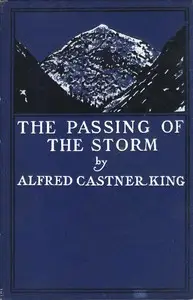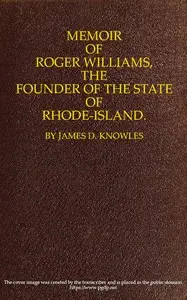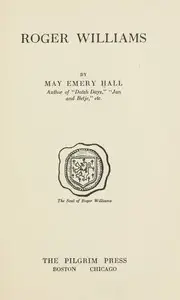"What Cheer; Or, Roger Williams in Banishment: A Poem" by Job Durfee is a historical poem that tells the story of Roger Williams, a strong believer in religious freedom who gets kicked out of the Massachusetts Bay Colony because of what he believes. The poem shows the hard times he goes through while he's exiled and also what kind of person he is, the problems he deals with, and the big ideas of doing what's right and being free. The poem starts by showing Williams during a bad winter as he deals with being exiled. It paints a clear picture of his home in Salem and how it's protected from the winter storm, and how sad his family feels about him leaving. When a messenger from the Governor tells him he's banished, Williams doesn't back down. The poem shows how much he wants friends and support, as it shows his true commitment to chasing after a society centered on freedom, which becomes a focus as the poem goes on.

What Cheer; Or, Roger Williams in Banishment: A Poem
By Job Durfee
A banished man faces fierce weather and even fiercer opposition as he fights for freedom.
Summary
About the AuthorJob Durfee was a politician and jurist from Rhode Island. Born at Tiverton, he graduated from Brown University in 1813 and was admitted to the bar and commenced practice in Tiverton. He was a member of the Rhode Island House of Representatives from 1816 to 1820, and was elected as a Democratic-Republican to the Seventeenth Congress and was reelected as an Adams-Clay Republican to the Eighteenth Congress, serving from March 4, 1821 to March 3, 1825. He was an unsuccessful candidate for reelection in 1824 to the Nineteenth Congress and for election in 1828 to the Twenty-first Congress; he was again a member of the State house of representatives from 1826 to 1829, serving as speaker from 1827 to 1829. He declined to be a candidate for reelection and resumed the practice of law; in May 1833 he was elected associate justice of the Rhode Island Supreme Court. He was chief justice from June 1835 until his death in Tiverton in 1847. As chief justice, he presided over the trial of the last person executed in Rhode Island, John Gordon. Durfee's interment was in the family burying ground at Quaker Neck, near Tiverton.
Job Durfee was a politician and jurist from Rhode Island. Born at Tiverton, he graduated from Brown University in 1813 and was admitted to the bar and commenced practice in Tiverton. He was a member of the Rhode Island House of Representatives from 1816 to 1820, and was elected as a Democratic-Republican to the Seventeenth Congress and was reelected as an Adams-Clay Republican to the Eighteenth Congress, serving from March 4, 1821 to March 3, 1825. He was an unsuccessful candidate for reelection in 1824 to the Nineteenth Congress and for election in 1828 to the Twenty-first Congress; he was again a member of the State house of representatives from 1826 to 1829, serving as speaker from 1827 to 1829. He declined to be a candidate for reelection and resumed the practice of law; in May 1833 he was elected associate justice of the Rhode Island Supreme Court. He was chief justice from June 1835 until his death in Tiverton in 1847. As chief justice, he presided over the trial of the last person executed in Rhode Island, John Gordon. Durfee's interment was in the family burying ground at Quaker Neck, near Tiverton.









![The poems of Winthrop Mackworth Praed. [selected] by Winthrop Mackworth Praed](https://cdn.a2-host.cloud/f9Ls7GEVYIwJquc1nLle7euhcLtaF9KVbGXtXUxQcvU/rs:fill:215:325:0/g:ce/aHR0cHM6Ly9zcC1hc3NldHMuczMudXMtd2VzdC0wMDQuYmFja2JsYXplYjIuY29tL2Jvb2svNzEwMDgvVGhlX3BvZW1zX29mX1dpbnRocm9wX01hY2t3b3J0aF9QcmFlZF9zZWxlY3RlZF9jb3Zlci5qcGc.webp)




